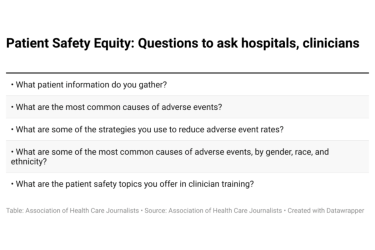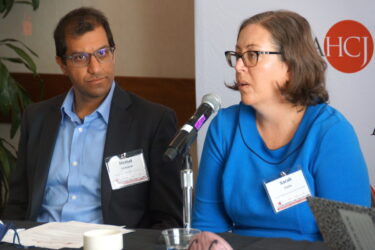
All eyes were on the U.S. Supreme Court last week as it handed down its highly anticipated decision in King v. Burwell, affirming subsidies in the Affordable Care Act. The justices upheld the financial assistance, saying Congress saw it as critical to a functioning health insurance market. But could the court’s other big ruling have an equally profound impact on another group?
On Friday, the court ruled 5-4 in support of same-sex marriage, saying the Fourteenth Amendment gave such couples the right to marry and legalizing marriage in all 50 U.S. states. While an affirmation of LGBT rights, the decision could also be the first step in improving the health of same-sex couples, according to several health provider organizations that released statements soon after the landmark ruling.
The American Public Health Association (APHA), which had filed a friend-of-the-court brief in the case, Obergefell v. Hodges, said that not only did the decision chip away at discrimination and stigma that can harm health, it also could “extend the health benefits of marriage to all couples.”
“Research has shown that marriage contributes to better health and longevity. Discriminatory marriage policies are detrimental to the LGB population and contribute to poor health outcomes. No American should be denied the opportunity to attain their highest level of health, and thanks to this ruling, same-sex couples can now enjoy health benefits of marriage equal to those of opposite-sex couples,” APHA Executive Director Georges Benjamin, M.D., said in a statement on Friday.
The American College of Physicians, in its statement on Friday, noted that the decision to allow same-sex marriage would also have the benefit of extending equal access to health care. “The denial of such rights can have a negative impact on the physical and mental health of these persons and contribute to ongoing stigma and discrimination for LGBT persons and their families,” the group wrote in a position paper in May on health disparities in the lesbian, gay, bisexual and transgender community, published in the Annals of Internal Medicine.
Research has shown the health issues for those in the LGBT community go beyond discrimination and stigma. LGBT individuals report overall poorer health, are at higher risk for some cancers, and have higher rates of heart disease, researchers with the Kaiser Family Foundation said in an April 2015 review of available literature.
To be sure, not all of the nation’s medical associations reacted publicly to the ruling, supportive or not. Even as polls show growing acceptance of gay marriage, many such groups have said they are nonpartisan and may be reluctant to wade into what is still a thorny political issue.
The American Medical Association, which posted a statement on King v. Burwell on its website, has not posted any statement on Obergefell v. Hodges. But representatives for the AMA, asked about the group’s reaction, offered a statement from one of its board members, Jesse Ehrenfeld, M.D., M.P.H. The group was pleased with the court’s decision on same-marriage, he said, “because it ends a form of discrimination and will help reduce health care disparities among same-sex couples and their families” and adding that the AMA has long supported polices that offer same-sex families equal access to health care, health insurance and survivor benefits.
Other medical associations also did not release public statements, although some posted news about the decision on their Twitter feeds.
And, as some gay rights groups noted in the shadow of Friday’s ruling, the Supreme Court legalized gay marriage but it did not address other forms of LGBT discrimination, from workplace policies to being refused service, that could still impact health.
So, while many health journalists and organizations are understandably chasing follow-up stories on Obamacare, now is also an opportunity to pay attention to SCOTUS’ other big ruling and its potential on health. Here are some thoughts:
- Reach out to health organizations, providers and associations and see if or how the ruling is changing their approach, message, health care and education efforts.
- Ask your audience if the ruling is or will affect their health care – will people who had trouble before accessing care see a difference now that they can marry? What about their dependents?
- Find researchers who have been studying LGBT health – are any planning new research given the marriage ruling? Or have any been studying the impact of LGBT marriage in states where it was already legal (and when are their results due)?
- Are there ways to document how the ruling – and its affect on discrimination and stigma – are playing out, even anecdotally, on LGBT health?
- What has data on LGBT families with children shown in the past – and what changes might the future bring?
Are you writing about Obergefell v. Hodges and any health care angles? Let us know. Meanwhile, AHCJ is expanding its Social Determinants core topic area to include more about LGBT health – got a tip? Email me at determinants@healthjournalism.org.









